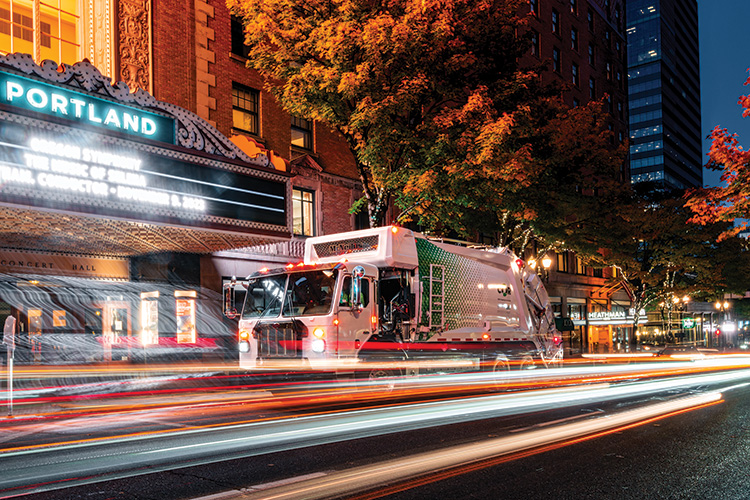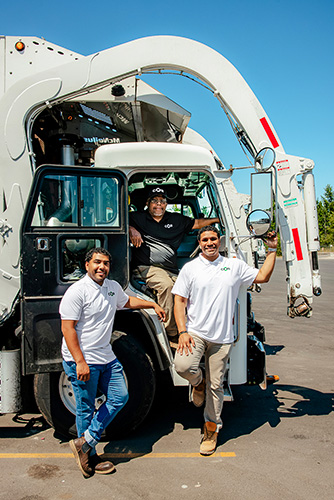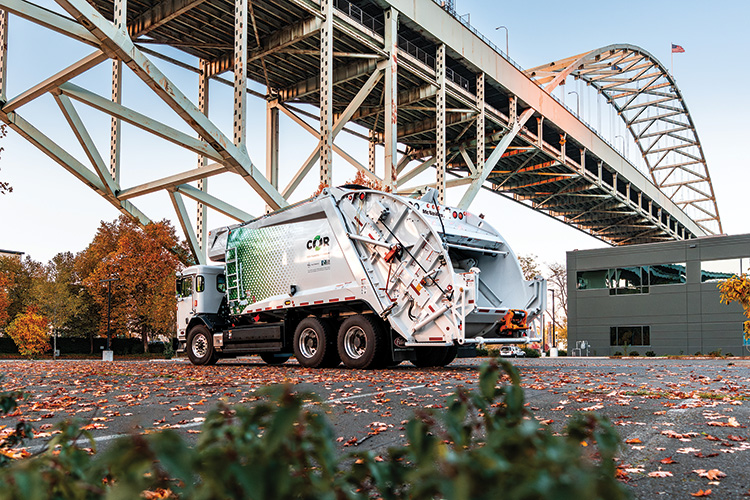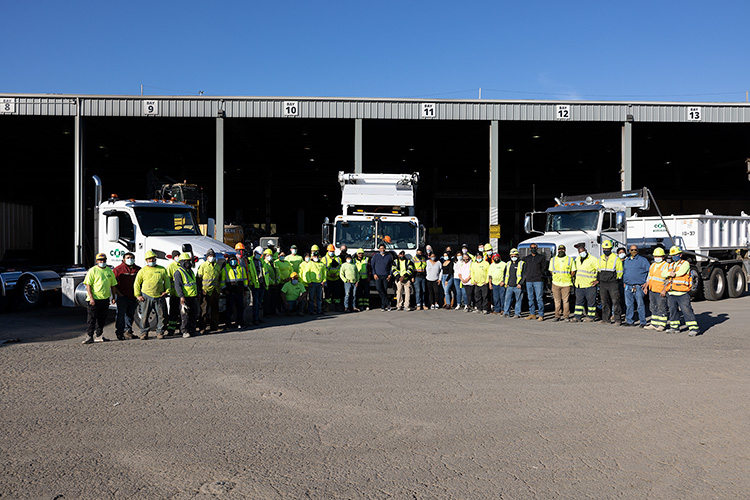As a full suite materials management company, COR Disposal & Recycling continues to grow the company by expanding their MRFs, strengthening their partnerships around the region, investing in employees, and developing a circular economy campus where they will be incubating innovative business startups using waste products as raw material to create innovative products.
Founded in 1996 by Alonzo Simpson, COR Disposal & Recycling (COR) (Portland, OR) started its operation with one roll-off truck and container collecting construction and demolition debris. The business was a side gig for Alonzo. At the time, he worked full-time for the City of Portland’s Maintenance Bureau. He wanted to build a business where he could work outside of regular work hours. When he started COR, he worked jobs on nights, mornings, and weekends. Over the years, he grew the business by knocking on doors and focusing on customer service. At the time that Alonzo was starting the business, his son, Alando, was 12 years old. He helped out by washing trucks, maintaining containers, and doing other odd jobs around the yard. “I’ve always been around it and I grew more serious about it in about 2006 when I moved back to Portland,” says Alando. Now a family affair, Alando is the CEO of the company while his brother AJ is the COO. Alonzo mostly spends his time these days driving around the transfer station in his pickup truck providing his input on operational improvements.

As a full suite materials management company, including waste and recycling collections, waste and recycle processing, houseless camp clean ups, demolition services, and consulting, COR deals with all types of recycling material, except for curbside recycling—that is left to the franchisees/private haulers. COR curerntly operates 20 vehicles, including roll-offs, side loaders, rear loaders, and long haul, and employs 85 people. They have a rigorous training program not only for drivers, but also those who are onboarding and working in the MRF and transfer station. “In order to ensure we have a safe workplace, safety is led by an environmental health and safety manager who takes his job very seriously. We also have biweekly safety meetings per department, and we have a safety committee that meets once a month. We are always trying to better figure out best practices and better ways to manage safety concerns that are rising in solid waste facilities across the industry, so we are overly cautious about safety and making sure we are not putting ourselves or our employees in a volatile position. One of the big challenges that we’ve had to deal with is insurance rate hikes as a result of widespread facility fires; however, it is better to be safe than sorry. We are staying optimistic, and making sure that we have enough protocols and extinguishing devices in place in the event of a fire,” says Alando.

Photos courtesy of COR Disosal & Recycling.
Forward Investments
When Alando returned the Portland in 2007, the goal was to build a material recovery facility (MRF). At the time, with six trucks in service, Alonzo’s dream was eventually to create his own facility to process materials. “He has always been a big advocate for recycling and instilled that lesson in us very early in our lives,” says Alando. “He wanted to make sure that he could provide better recycling services for clients. My goal coming into this was to help him develop that first facility.” Ironically, when COR opened their first 6,000 square foot facility on a 1.75-acre property in 2014, they immediately ran out of space. So, three years later, COR ended up acquiring a 12-acre site with a 100,000 square-foot facility and opened a MRF and transfer station in the fall of 2018; however, they are close to dealing with the same growing pains again. Alando explains, “We opened it as a new property and then were able to get our franchise to operate the transfer station in August 2019. At that point we controlled a little under 2 percent of the market share of solid waste in the entire tri-county region—there are about 2.5 million people in the Portland metro. Today, we are getting closer to 13 percent of the processing facility market share, so it’s been a rapid growth.” In Portland, it is a little different than other locations in the country because COR must deal with a regional government that designates how much volume each facility can have. If the facility reaches its volume max, haulers must go to the next one that has enough space—that is how the system is regulated in the metropolitan region. Plus, COR serves only the city of Portland as it pertains to waste collections. “There is a franchising law that does not allow us to serve any other area, and so we are solely confined to the city of Portland,” says Alando.
He stresses that when COVID hit, it did not have too much of an effect on the facility, since municipal solid waste does not stop. If waste volume drops in commercial buildings, that means waste volumes have increased in households. However, their drop box services division for construction did slow down a little and the construction industry became a volatile area. While commercial collection did slow, COR was able to obtain some municipal contracts that helped. The other aspect Alando saw was that before COVID, interest rates for the economy were so high that it became concerning. “It was more challenging for us before COVID, however, when the pandemic happened, the rates dropped and then stabilized. Plus, since we are an essential business, we put protocols in place to ensure that people could work safely in the office and at the facility. We never stopped working.”

Most recently, COR invested in an electric garbage truck from Peterbilt (Model 520EV). Currently running diesel trucks, Alando points out that garbage trucks are expensive and their collection system in Portland is a little more complicated than a lot of the other markets. “We always had to be creative and thrifty in acquiring our equipment during our development,” comments Alando. “We started off by using trucks with renewable bio diesel, which is 20 percent B20 fuel in our fleet, and now we use B99 fuel in all of our fleet. We felt that this was important from an environmental perspective in order to step into alternative forms of transportation fuels in an effort to decarbonize the transportation sector. Collections plays a big role in this, so when the opportunity came, it was time for us to step into that space.” Alando says that they looked for the right partners to bring this perception into reality. “It has been something that we have been working towards to ensure that we are implementing sustainability and the triple bottom line from an environmental, economic, and social equity perspective in bringing that paradigm to the solid waste system. We were able to pursue a grant and work with two organizations who were very instrumental in the process, including Columbia Willamette Clean Cities, as well as Portland General Electric, which came up with a strategy on how we could support pursuing something that would drive change, innovation and turn that concept into reality.” Supply chain challenges did create hindrances during that time as it relates to their electric garbage truck, causing several delays, but Alando says they managed through the process. The vehicle will be operating on their municipal, solid waste contracts for public trash cans. Alando emphasizes that the experience has been great that they have been learning a lot about the truck and its operation.

Photos courtesy of COR Disposal & Recycling.
Transitioning to the Circular Economy
As the only African American owned, semi-vertically, integrated, solid waste and recycling company in the country, Alando stresses that he wants to inspire his successors and show others that there are opportunities in other segments of the economy. “Unfortunately, a lot of kids like me are conditioned to believe that basketball, football, and music are their only pathways to economic independence and success. I just want to be a beacon and inspire others that this career path exists, especially as our country is getting ready to transition to a clean, green economy in the 21st century,” he explains. “I want to ensure that equity is not just a talking point, but a real experience, especially as it pertains to an economic development strategy for our country. A decarbonization model should be in alignment with the triple bottom line, so being in this space and working within the green economy is an obligation and responsibility that I take very seriously.” He says that the one thing that he is most proud of is the support and interest that people have given as the company evolves and grows to support a circular economy, business innovation, and taking waste products and converting them into renewable products and materials for the 21st century. “Industrial manufacturing and blue-collar jobs created middle-class America in the 20th century, and I am a firm believer that the green economy and green manufacturing and infrastructure in the circular economy can fill that void in the 21st-century with green jobs to rebuild middle-class America,” says Alando. “It takes an army, like myself as an operator as well as financial institutions, energy companies, publications and marketing outfits, public policy, and elected officials to really double down and ensure that we can stay competitive globally in the 21st century.”
Alando comments that he has been talking about the concept of circular economy for six years and he sees it gaining traction, so he is excited and optimistic about it. There have been some policy changes that are coming down the pike within the state of Oregon that are essentially laying the groundwork to support this type of work, such as the Plastic Pollution and Recycling Modernization Act that passed in 2021. “This really emphasized extended producer responsibility concepts. My role on the council is to help guide the rules on how it is going to roll out over the next couple years,” says Alando. “There is also one big element that the city is working on called the clean industry hub. This is a concept of industrial symbiosis, where one operation’s waste becomes another operation’s value-added commodity, whether it is water, energy or materials. This is a model that exists in Denmark, so Portland and places in the Pacific Northwest like Washington are trying to spearhead getting ahead of this and COR has been front and center working with the city of Portland to figure out the framework and policies. They are going to create a plan around how they want to work with industrial businesses and manufacturers in a more clean, green fashion.”
Because many of these strategies are still in the works, COR makes a point to communicate consistently with their communities on what is happening since much of it will be interconnected to the company’s development plan—the COR Campus. This will be a circular economy campus where COR will be incubating innovative business startups and using their waste products as raw material to create innovative products. “Right now, we’re getting ready to build our next organics phase and are starting with animal feed. Then, we will be looking at some other things as a pertains to polymers, i.e. plastics, wood products, aggregates, and textiles. I believe textiles is the next big global issue because there is no supply chain tracker that informs us on what going is on with any apparel after it leaves our country. Once it leaves our hands, there will be a lot more opportunity for us to have accountability on how we upcycle and repurpose textiles, especially since they’re no longer just fibers; there is major growth in the polymer side of clothing as well, so figuring out innovative platforms and how we address that issue and the waste stream is going to be key in our future. We are excited to step into the space and figure out management solutions,” explains Alando. “Currently, we’re looking to add more real estate property to our 12-acre facility because we want those innovators and technologies that are out there to relocate and scale in our region. To be more specific, these innovations will be housed together at the COR Campus, as well as R&D and professors and chemists from highly rated institutions in the area, working on these material sciences to figure out how we start remanufacturing waste products in our country and bring manufacturing back to the U.S.”
The Next Steps
For now, COR’s focus going into 2024 is going to be building out more infrastructure on the commercial side of collections and making sure they strengthen their partnerships and relationships with campuses and institutions like hospitals, colleges, sporting venues, and governments to come up with a well thought out organic, mixed recycling, and waste plan. Alando says, “Wherever we can support circular concepts and innovation is advantageous not only for our constituents that are located on this campus, but also as part of our sustainability goals. This will be our next big focus as we continue to grow in our commercial collections space, make capital investments, and expand our footprint in the solid waste system within the metropolitan region.”
He continues, “As COR has grown, we also continue to invest in our employees. We work with several community-based organizations that target diversity and people coming out of incarceration as second chance employees. We try to get creative with our partnerships and our coalitions around the entire region, whether they are government agencies or working with workforce development organizations to ensure that we are providing job opportunities for those that need access to those green and clean industry jobs with lower barriers to entry. We operate off our values and principles of who we are with our people and reputation in the community, and they have been very supportive in our growth because we walk our talk. It’s part of our culture, in our DNA, our principles, and ethos that our father instilled in me and my siblings, and we stand by it.” | WA
For more information, visit https://cordr.com.
